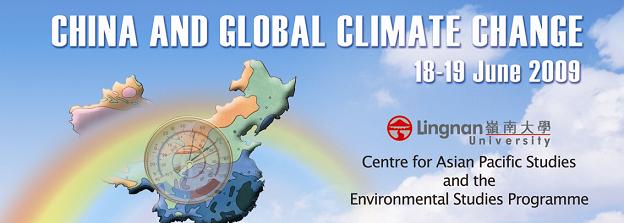
Event Title
Conference on China and Global Climate Change : Reconciling International Fairness and Protection of the Atmospheric Commons
Location
AM308, Lingnan University
Start Date
18-6-2009 11:00 AM
End Date
18-6-2009 12:30 PM
Language
English
Description
Following the conclusion of the official work of the Ad hoc group for the modelling and assessment of contributions of climate change (MATCH), this paper takes a look on the politically more sensitive aspect of the Brazilian Proposal, namely the issue of differentiating (historic) responsibility for, and not merely (causal) contribution to climate change. Its aim is (i) to highlight the fact that, while related, the two issues (‘contribution to’ and ‘responsibility for’) are fundamentally different and should not be confused, (ii) to propose a methodology of calculating shares of responsibilities as opposed to the shares in causal contribution arrived at in the MATCH results, and (iii) apply these conceptions in depth in the case of China. Two conceptions of responsibility (‘strict’ or ‘limited’) are applied to operationalise the notion of ‘respective capabilities’ given in Article 3.1 of the UNFCCC. The key message resulting from the calculations is that causal contribution – while an important indicator of (environmental) relevance to the problem – must not be confused with moral responsibility for it. The rather large difference between the responsibilities at the two extremes of the scale under both conceptions does give pause for thought as to what sorts of burdens can justly be demanded in any application of the UNFCCC principle of common but differentiated responsibilities, whether in the context of the Brazilian proposal or beyond.
We apply these conceptions of responsibility to the case of China and discuss how they can inform the discussions over future commitments under a Copenhagen agreement.
Document Type
Presentation
Recommended Citation
Ellermann, C., & Höhne, N. (2009). Differentiating (historic) responsibilities for climate change: Exploring the case of China. In China and global climate change: Proceedings of the conference held at Lingnan University, Hong Kong, 18-19 June 2009 (pp. 78-99). Centre for Asian Pacific Studies and the Environmental Studies Programme, Lingnan University, Hong Kong.
Included in
Differentiating (historic) responsibilities for climate change : exploring the case of China
AM308, Lingnan University
Following the conclusion of the official work of the Ad hoc group for the modelling and assessment of contributions of climate change (MATCH), this paper takes a look on the politically more sensitive aspect of the Brazilian Proposal, namely the issue of differentiating (historic) responsibility for, and not merely (causal) contribution to climate change. Its aim is (i) to highlight the fact that, while related, the two issues (‘contribution to’ and ‘responsibility for’) are fundamentally different and should not be confused, (ii) to propose a methodology of calculating shares of responsibilities as opposed to the shares in causal contribution arrived at in the MATCH results, and (iii) apply these conceptions in depth in the case of China. Two conceptions of responsibility (‘strict’ or ‘limited’) are applied to operationalise the notion of ‘respective capabilities’ given in Article 3.1 of the UNFCCC. The key message resulting from the calculations is that causal contribution – while an important indicator of (environmental) relevance to the problem – must not be confused with moral responsibility for it. The rather large difference between the responsibilities at the two extremes of the scale under both conceptions does give pause for thought as to what sorts of burdens can justly be demanded in any application of the UNFCCC principle of common but differentiated responsibilities, whether in the context of the Brazilian proposal or beyond.
We apply these conceptions of responsibility to the case of China and discuss how they can inform the discussions over future commitments under a Copenhagen agreement.

